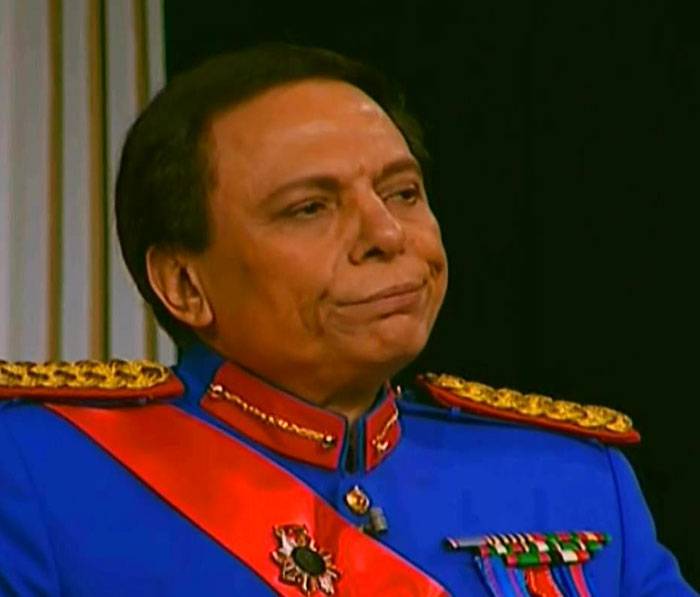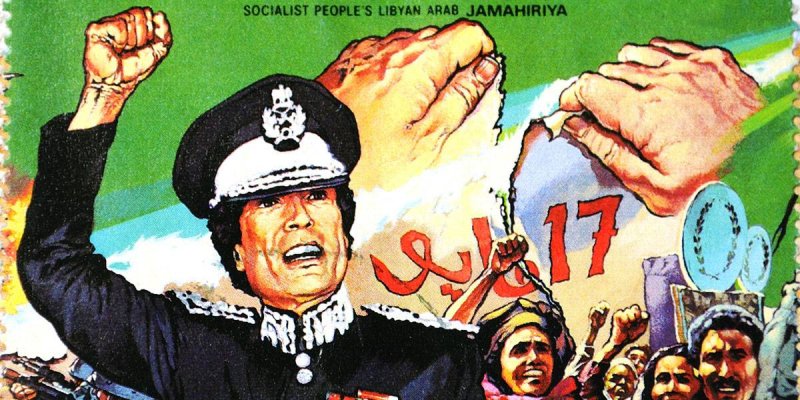On October 20, 2011, eight months after the outbreak of the revolution in Libya, deposed leader Muammar Gaddafi appeared in a video. He was captured and beaten by rebels. Soon after, he was reported dead and buried in an unknown place, marking an unexpected ending to an eccentric leader who, for decades, sought to be the leader of Arabs, Africans and Muslims. Muammar Mohammed Abdul Salam Abu Minyar Gaddafi was born in 1942 in the village of Jahannam in Sirte, Libya. In “The Dictator’s Last Night”, a novel published by Julliard publishing house, Algerian writer Yasmina Khadra addresses the childhood of the late president. Having suffered from poverty and humiliation during his childhood, Gaddafi rebelled against his tribe and pursued his studies, a step that no other member of his family had ever taken before. He studied in the United Kingdom and was later promoted in the army. Libyan politician Dr. Mohammed el-Magariaf wrote about Gaddafi’s time in Misrate School in his book, A Coup Led by an Informant. According to the author, Gaddafi was accepted to the school because he was tasked with informing on his politically active colleagues to the security apparatus of the royal regime. In that unknown place where Gaddafi is buried, there are also many of his strange dreams. While some of them were fairly simple, such as seeing the soap opera he authored aired on TV in Ramadan 2011, others were as major as his dream of having a nuclear bomb. Here is a list of some of the best Gaddafi dreams.
The Nuclear Bomb

On September 15, 2008, The Independent wrote that Libya had reached an advanced stage in its nuclear program, with the help of Pakistani scientist Abdul Qadeer Khan. The Atomic Agency later confirmed in a report that Libya had been in contact with the scientist since 1984. Following the invasion of Iraq in 2003, Gaddafi agreed to dismantle the Libyan nuclear program, a process that started in 2004 and took six years to complete.
Merger Attempts
Gaddafi’s attempts to merge with numerous Arab states all failed, including the Federation of Arab Republics with Egypt and Syria in 1971. However, lasting less than 24 hours, the merger with Tunisia on January 12, 1971 under the name of “The Arab Islamic Republic”, was the fastest to fall.Great Man-Made River
On October 28, 2010, Al Jazeera reported that the Turkish-Libyan agreement to supply water from the Manavgat Turkish river to Libya sought to address the water crisis in the latter. With too many exaggerations surrounding the project, the Great Man-Made River came to be known as the “eighth wonder of the world”. According to official figures, Libya spent more than 9 billion Libyan Dinars on the project (11 billion USD) to transport water from aquifers in the south to residential areas in the North.The State of Isratine
In the early twenty-first century, Gaddafi wrote The White Book in which he proposed a state that merges both Israel and Palestine. He also wrote an article for the New York Times, in which he argued that the war on Gaza will continue to feed the cycle of violence until Israelis and Palestinians understand that they need to live peacefully in one state, to be called Isratine.Dismantling Switzerland
On September 4, 2009, Swiss TV reported that Colonel Muammar Gaddafi had officially called on the General Assembly of the United Nations to dismantle Switzerland and parcel out the land among neighboring states. His odd request came during the G8 summit in July, 2009 in Italy, after Swiss authorities had arrested one of his sons accused of assaulting two of his staff.The Libyan Rocket
In July 2015, pictures of a car that was reportedly designed by Gaddafi in 2009 made headlines. Calling it the “rocket of Al-Jamahiriyya”, Gaddafi described it as “the best car to ensure safety and address transportation problems and accidents in the country.” It was first announced in the Congress of the African Union. According to the initial plan, the production would start in Tripoli after building the factory where it will be manufactured and assembled.Screening his Soap Opera
In its September 10, 2010 edition, Al-Quds Al-Araby newspaper quoted Syrian author and novelist Fadel Affash, who said the shooting of the “Escape From Jahannam”, a soap opera written by Gaddafi, would start soon. Affash added that he and the Syrian production company were only waiting for the colonel to give his blessings to start what he described as “a major high-tech production”. According to the novelist, the soap opera revolved around Gaddafi’s life, starring Egyptian actor Mohyi Ismail, who looked like the Libyan leader.Assassinating Adel Imam
On January 10, 2014, An-Nahar newspaper quoted Egyptian make-up artist Mohammed Ashoub saying that Gaddafi had tried to assassinate renowned actor Adel Imam over his role in the “Azza’im” (The Leader) play. After being told that the actor had been mimicking him in the play, Gaddafi asked to have Imam perform the play in Libya, where he could kill him.
“A friend, who was close to the Libyan leadership and intelligence apparatus, informed me of the intentions of the regime. I went to Abdullah Mansour, Minister of Communication at the time, and warned of a major diplomatic row in the Arab region should anything happen to Imam in Libya. The minister later cancelled the performance in Libya, and Gaddafi immediately ordered the arrest of Mansour”, Ashoub recalls.
A Bizarre Character
Self-proclaimed “dean of Arab rulers and King of African Kings”, Gaddafi was known for his bizarre character. The following are some of his most famous quotes that had long amused Arabs: Shakespeare is originally an Arab and his real name is Al-Shaikh Zubair; Obama’s father is Hussein Abu Oumama; Women have the right to run for elections whether they are male or female; Filial piety is more important than obeying your mother and father; The difference between a man and a woman is that a man is a male and a woman is a female; it is imperative to determine the sex of death, for one should fight it till the end if it’s a male and yield to it till the last breath if it’s a female. [post_quote/] Managing editor of Al-Akhbar newspaper and head of Arab affairs Osama Ajjaj told Raseef22: “I met Gaddafi for the first time in 1990, and I found him to be a complex character. While some described his ideas as fantasies with no possibilities to ever materialize, he genuinely believed in their feasibility. He also talked about these ideas in his Green Book, which he wrote after assuming power in Libya”. For Ajjaj, Gaddafi’s greatest dream was the unity of the Arab world: “To that end, he engaged in several conflicts, including the most famous with Egypt and Saudi Arabia. The country also faced tensions with Algeria and Sudan. When he realized that his dream was impossible, he took it to the Organization of the African Unity, where he could win some African states to his side thanks to Libya’s capacities. He later changed the name of the organization to the ‘African Union’, believing that it was a step towards African unity.” According to Ajjaj, Gaddafi “thought he was leading the Arab world in its fight against the West. However, after the fall of Saddam Hussein, he sought to resolve all conflicts with the West, including Lockerbie’s bombing. Deemed by many as a deviation from the Arab consensus towards Israel, Gaddafi had a vision to integrate Israelis and Palestinians in one democratic non-religious state. However, when Yasser Arafat signed the “Gaza – Jericho” agreement, he quickly expelled Palestinians from Libya, and later rescinded what turned out to be a human tragedy.” Ajjaj recalls an anecdote when “a journalist once asked Gaddafi while in India: Sadat says you’re crazy, how do you respond? Gaddafi said: I know Sadat as a president of Egypt and not a psychiatrist to decide who’s crazy and who’s not.” For Ajjaj, the Libyan dictator “actually benefited from these labels as ‘atypical’ and ‘unruly’ to maintain his tight grip on the country”. Speaking to Raseef22, psychiatrist Dr. Hisham Nassef said that “Gaddafi was a military leader with modest mental abilities; he was neither stupid nor extremely intelligent. His abilities did not qualify him to lead a country to prosperity, and he respected a weapon more than its bearer”. For Nasssef, Gaddafi’s “narcissistic personality disorder was his main problem, as he wasn’t as smart as he believed. Reflecting on his life, I believe he was a moody person, who lacked logic in most of his decisions.”Raseef22 is a not for profit entity. Our focus is on quality journalism. Every contribution to the NasRaseef membership goes directly towards journalism production. We stand independent, not accepting corporate sponsorships, sponsored content or political funding.
Support our mission to keep Raseef22 available to all readers by clicking here!
Interested in writing with us? Check our pitch process here!





